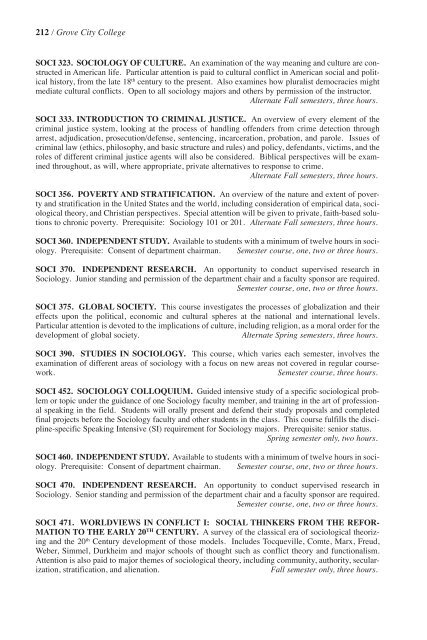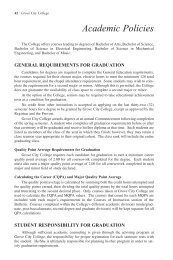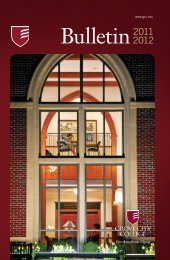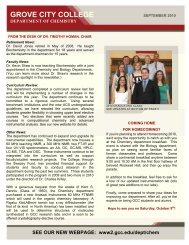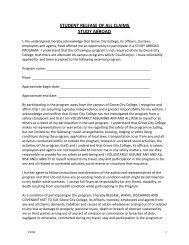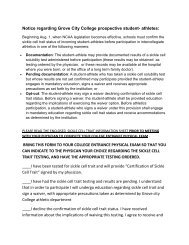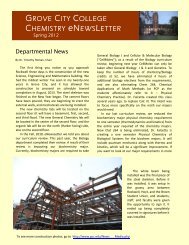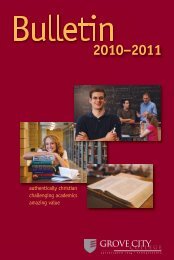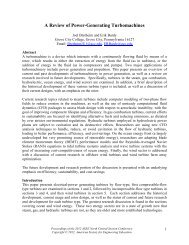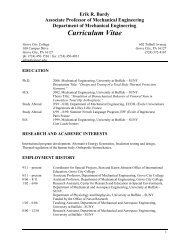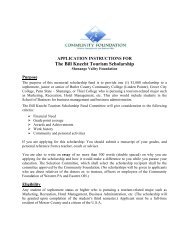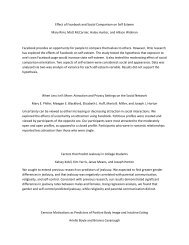2009–2010 - Grove City College
2009–2010 - Grove City College
2009–2010 - Grove City College
Create successful ePaper yourself
Turn your PDF publications into a flip-book with our unique Google optimized e-Paper software.
212 / <strong>Grove</strong> <strong>City</strong> <strong>College</strong><br />
SOCI 323. SOCIOLOGY OF CULTURE. An examination of the way meaning and culture are constructed<br />
in American life. Particular attention is paid to cultural conflict in American social and political<br />
history, from the late 18 th century to the present. Also examines how pluralist democracies might<br />
mediate cultural conflicts. Open to all sociology majors and others by permission of the instructor.<br />
Alternate Fall semesters, three hours.<br />
SOCI 333. INTRODUCTION TO CRIMINAL JUSTICE. An overview of every element of the<br />
criminal justice system, looking at the process of handling offenders from crime detection through<br />
arrest, adjudication, prosecution/defense, sentencing, incarceration, probation, and parole. Issues of<br />
criminal law (ethics, philosophy, and basic structure and rules) and policy, defendants, victims, and the<br />
roles of different criminal justice agents will also be considered. Biblical perspectives will be examined<br />
throughout, as will, where appropriate, private alternatives to response to crime.<br />
Alternate Fall semesters, three hours.<br />
SOCI 356. POVERTY AND STRATIFICATION. An overview of the nature and extent of poverty<br />
and stratification in the United States and the world, including consideration of empirical data, sociological<br />
theory, and Christian perspectives. Special attention will be given to private, faith-based solutions<br />
to chronic poverty. Prerequisite: Sociology 101 or 201. Alternate Fall semesters, three hours.<br />
SOCI 360. INDEPENDENT STUDY. Available to students with a minimum of twelve hours in sociology.<br />
Prerequisite: Consent of department chairman. Semester course, one, two or three hours.<br />
SOCI 370. INDEPENDENT RESEARCH. An opportunity to conduct supervised research in<br />
Sociology. Junior standing and permission of the department chair and a faculty sponsor are required.<br />
Semester course, one, two or three hours.<br />
SOCI 375. GLOBAL SOCIETY. This course investigates the processes of globalization and their<br />
effects upon the political, economic and cultural spheres at the national and international levels.<br />
Particular attention is devoted to the implications of culture, including religion, as a moral order for the<br />
development of global society. Alternate Spring semesters, three hours.<br />
SOCI 390. STUDIES IN SOCIOLOGY. This course, which varies each semester, involves the<br />
examination of different areas of sociology with a focus on new areas not covered in regular coursework.<br />
Semester course, three hours.<br />
SOCI 452. SOCIOLOGY COLLOQUIUM. Guided intensive study of a specific sociological problem<br />
or topic under the guidance of one Sociology faculty member, and training in the art of professional<br />
speaking in the field. Students will orally present and defend their study proposals and completed<br />
final projects before the Sociology faculty and other students in the class. This course fulfills the discipline-specific<br />
Speaking Intensive (SI) requirement for Sociology majors. Prerequisite: senior status.<br />
Spring semester only, two hours.<br />
SOCI 460. INDEPENDENT STUDY. Available to students with a minimum of twelve hours in sociology.<br />
Prerequisite: Consent of department chairman. Semester course, one, two or three hours.<br />
SOCI 470. INDEPENDENT RESEARCH. An opportunity to conduct supervised research in<br />
Sociology. Senior standing and permission of the department chair and a faculty sponsor are required.<br />
Semester course, one, two or three hours.<br />
SOCI 471. WORLDVIEWS IN CONFLICT I: SOCIAL THINKERS FROM THE REFOR-<br />
MATION TO THE EARLY 20 TH CENTURY. A survey of the classical era of sociological theorizing<br />
and the 20 th Century development of those models. Includes Tocqueville, Comte, Marx, Freud,<br />
Weber, Simmel, Durkheim and major schools of thought such as conflict theory and functionalism.<br />
Attention is also paid to major themes of sociological theory, including community, authority, secularization,<br />
stratification, and alienation. Fall semester only, three hours.


